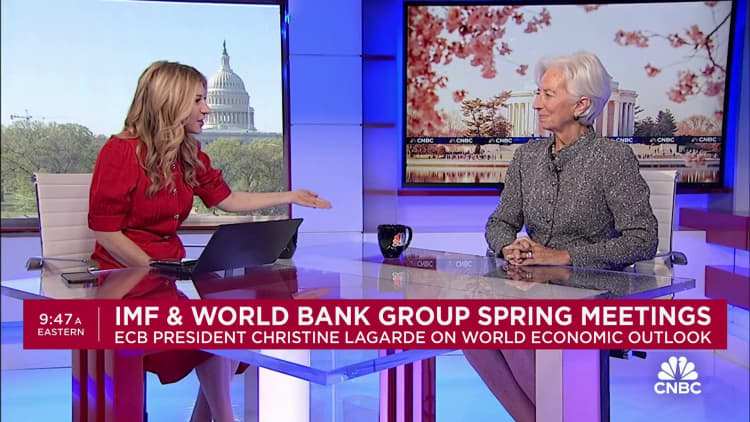Robert Holzmann, governor of Austria’s central financial institution, speaks throughout an occasion in Vienna, Austria, on Tuesday, Sept. 26, 2023.
Bloomberg | Bloomberg | Getty Photos
Tensions within the Center East pose the largest risk to a potential rate of interest minimize from the European Central Financial institution, in accordance with ECB policymaker Robert Holzmann.
“At this stage, I feel the largest risk is geopolitics, as a result of we now have seen what’s occurred within the Center East,” Austrian central financial institution governor Holzmann instructed CNBC’s Karen Tso on Wednesday on the sidelines of the Worldwide Financial Fund Spring Conferences.
“As you possibly can think about, solely when a ship is sunk within the [Strait] of Hormuz and you will have a distinct oil value, and this after all could require us to rethink our technique,” he added.
His feedback echo the view of ECB policymaker Olli Rehn, who on Tuesday mentioned the probability for a June charge minimize hinged upon inflation falling as anticipated, noting that the largest dangers to financial coverage stem from Iran-Israel tensions and the Russia-Ukraine conflict.
“The largest dangers stem from geopolitics, each the deteriorating state of affairs in Ukraine and the attainable escalation of the Center East battle, with all their ramifications,” Rehn, who serves because the governor of the Financial institution of Finland, mentioned in an announcement. “As summer time approaches we will begin decreasing the extent of restriction in financial coverage, supplied that inflation continues to fall as projected.”
Holzmann is broadly thought-about to be one of the vital conservative members of the ECB’s foremost decision-making physique and has warned it’s safer to not rush rate of interest cuts. He lately instructed Reuters that the ECB may average charges in June, indicating a rising consensus for a near-term transfer.
ECB President Christine Lagarde on Tuesday mentioned the central financial institution was closing in on a charge discount, barring any main surprises.
“We’re observing a disinflationary course of that’s transferring in accordance with our expectations,” Lagarde instructed CNBC’s Sara Eisen.
“We simply have to construct a bit extra confidence on this disinflationary course of but when it strikes in accordance with our expectations, if we do not have a serious shock in improvement, we’re heading in the direction of a second the place we now have to average the restrictive financial coverage,” Lagarde mentioned.
Within the absence of a shock, Lagarde mentioned it will be time for the central financial institution to trim charges “in comparatively brief order,” with out offering any additional particulars.
Policymakers and economists have zeroed in on June because the month when charges may begin to be lowered.

The ECB on Thursday left its coverage unchanged for the fifth consecutive assembly, however signaled that cooling inflation means the establishment may quickly begin to average charges.
In a shift from earlier language, the ECB mentioned “it will be applicable” to decrease its 4% deposit charge if underlying value pressures and the influence of earlier charge hikes had been to spice up confidence that inflation is falling again towards its 2% goal “in a sustained method.”
Hypothesis that the ECB may quickly begin reducing charges comes whilst buyers have slashed their bets on Federal Reserve charge reductions. Merchants now ascribe a roughly 20% probability of a Fed charge minimize in June, after yet one more inflation print confirmed client costs stay sticky.
— CNBC’s Jenni Reid contributed to this report.